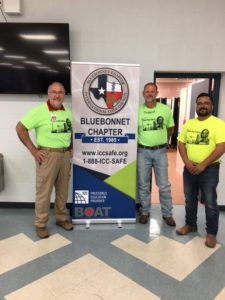
Opening a pathway to the construction profession
For as long as I can remember, all you would normally hear about post-secondary education was that if you wanted to be successful, you needed a four-year bachelor’s degree from a university. If you went to a community college or technical school, that was okay, but the real money was waiting for those who had the four-year degrees. And to an extent, I’m sure that was true… assuming you could find a job and overcome the mountain of debt from the school loans that usually went along with the education.
More specifically, I heard someone say that going to a two-year school and taking building construction trades was a last resort before going into the military, where the armed forces would pay for your school if you agreed to serve in some capacity for a set number of years. I am not knocking that path by any means, but, ‘times, they are a-changing’ as the expression goes.

One of the critical areas of the nation’s strength is having people employed. One of those employment opportunities is found in the building sciences, or construction trades arena. I have had contractors tell me time and again, “I can’t find anyone learning the trades anymore!” By trades, I mean building construction (residential and commercial), including framing, mechanical, plumbing, electrical, welding, and finish-work (such as cabinet-making). Even in my field (inspections), we are having a hard time finding people who have experience in inspection work, or have the certifications through the International Code Council to do inspections. Plumbing inspectors, in particular, have to hold a state license.
In the early part of 2017, I had an opportunity to talk to Jim Ellwood, coordinator for the International Code Council’s High School Technical Training Program. Jim met Michael Carrillo, a Texas State Technical College Instructor with their Building Construction Trades program, at a SkillsUSA National Competition in Louisville, Ky. Following a few follow-up meetings, Michael incorporated the High School Technical Training Program into his curriculum. They were the first technical school in the state of Texas to incorporate the High School Technical Training program and adapt it to the college level. Since then, through countless face-to-face meetings, emails and conference calls, this program is exploding in the state of Texas, both at the high school and college level.
Many states around our country are experiencing a critical shortage of skilled workers. The average age of contractors and inspectors is around 50–55 years old. Many of these workers will be retiring in the next few years (me included). Who will take their place? We will always need houses to live in, buildings to work in, places to shop at, and venues for worship and entertainment. We need people skilled in design and construction to make this happen. Technology, so popular with the younger generation, already plays an important role in the construction industry through design, but what about actually having the know-how to build these structures?
What started out as a high school training program has now expanded not only to the college level but the Code Council is also offering this type of education for our military veterans when they finish their active service and want to apply what they learned in the military to civilian life, particularly in the construction and inspection fields.
Many schools work under the National Center for Construction Education and Research (NCCER) program, which teaches the necessary skills in carpentry, mechanical, plumbing and electrical work as well as Occupational Safety and Health Administration requirements. What Jim Ellwood and I tell students is that we are not in competition — but work in conjunction — with NCCER to provide the code knowledge that students must have to accompany their skills. You can be the best carpenter, plumber, electrician, or heating, ventilation and air conditioning subcontractor in your area, but you still have to have the knowledge and build to the codes.

That knowledge of the codes is also critical depending upon which area of the country you work in. The Code Council’s High School Technical Training Program gives high school students a basic knowledge of the codes while they are learning hands-on skills. When they graduate from high school they can then work during the summer, applying the skills they have learned, and go straight into the workforce or continue their education at a technical college offering a building trades program. Many may work in internships for a builder or contractor, which in turn, can lead into a full-time job position.
With a little more study, any of the high school trades students have another opportunity to sit for their full-blown ICC Residential Inspector Certification. While in high school, they more than likely will not have the time to do the studying necessary to take one of these exams. However, the door of opportunity is there, and with the help of their instructors, code officials and just the extra study time they can take this exam. Many who have done this have passed it the first time. This educational program is one of the most effective, yet inexpensive, that a school can get and pays huge dividends for the students who go through it.
Here are some final thoughts. As a member of the class of those retiring in the not-too-distant-future, I find it very gratifying to be able to share my experience to the next generation of code professionals and those in the construction industry. Although I don’t plan on going anywhere just yet, I thoroughly enjoy working with students on the high school and college levels. Not only do I get to emphasize the importance of codes — talking about scenarios that they will run into on the job — but just as important is the fact that I get to talk to them about good old-fashioned customer service. I emphasize that it does not matter how much you know — or how much you think you know — about the codes, design, construction and anything in between. If you don’t have the people-skills to go along with it, you will not be in business very long.
Good customer service speaks volumes for any profession and especially to those of us that work for municipalities and in the public sector on a daily basis. It doesn’t matter how many ICC certifications or state licenses you hold; the boss’ phone is on speed-dial with many citizens. Customer service is just as critical as any amount of knowledge of the codes. It is our responsibility to those students we have a chance to mentor to make sure they understand this if they want to be successful in their careers. Share your knowledge. Mentor a student, or students, any chance you get. It will pay big dividends for both you and for them.







